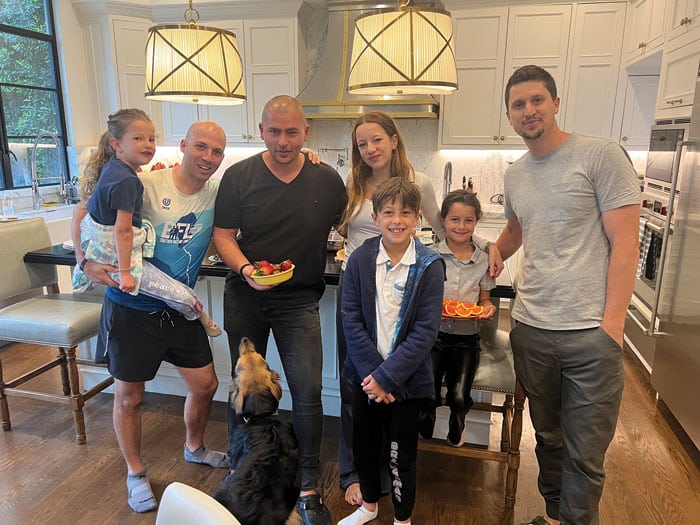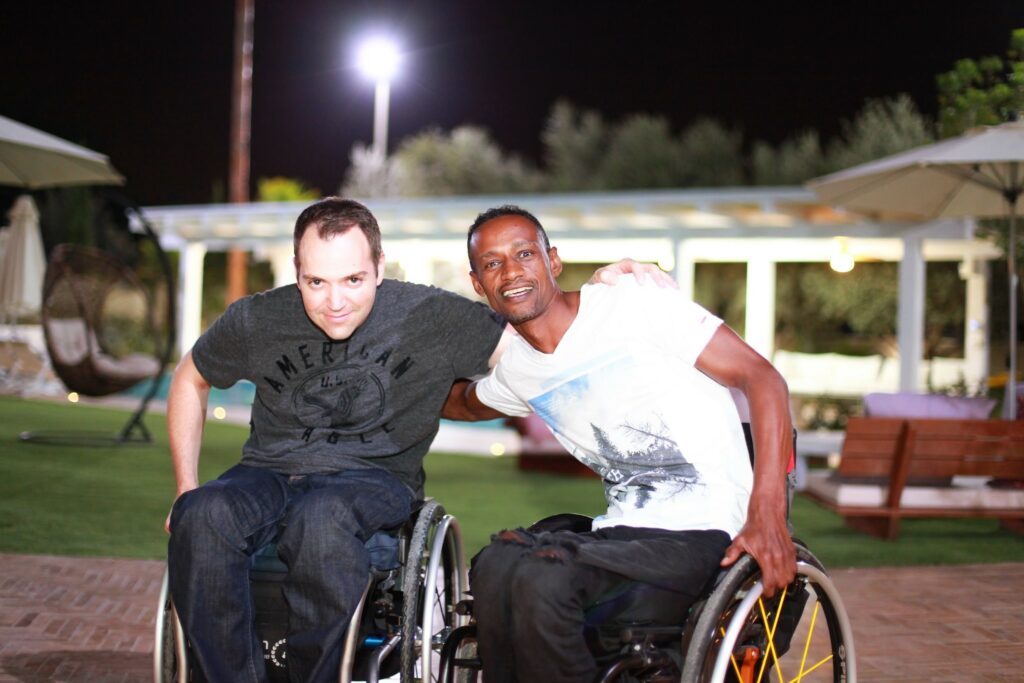Original article written for Jewish Journal by Ryan Torok
On the battlefield of recovery, Brothers for Life’s injured Israeli soldiers reclaim their lives one day at a time.
On a chilly spring evening, an excited group of nearly 50 people congregated in the backyard of a Beverly Hills home. They ordered margaritas, wine and cold beer at an open bar, loaded their plates with pita, hummus, Israeli salad and fresh kosher shawarma. Israeli music played. It could’ve been cocktail hour at a cousin’s wedding, or an open house on Bravo’s “Million Dollar Listing.”
But the ritzy affair was serving a decidedly more inspiring purpose, one having to do with the group of guys dressed more casually than the other guests and chatting in Hebrew by the bar.
These scruffy young guests were Israeli Defense Forces (IDF) veterans, visiting Los Angeles on a weeklong tour of entertainment, decompression and, most of all, healing. Their experience included overnight stays with host families, an afternoon at Universal Studios, a Lakers playoff game, shopping and fine dining in Beverly Hills and even friendly games of pickleball.
The intimate crowd of pro-Israel community members, organizational leaders and philanthropists gathered in the host’s living room, and several of the solders shared their stories. They offered vivid, descriptive and frightening first-person accounts from the front lines of combat in Israel.
As the soldiers described encountering gunfire from Hamas terrorists attempting to cross into Israel through underground tunnels; riding in an armed SUV in the West Bank that suddenly exploded because of a roadside bomb; outmaneuvering incoming artillery shells, their experiences may have felt lightyears away from daily life in Los Angeles, let alone a mansion in Beverly Hills, yet the bond between the speakers was undeniable.
All 10 of the IDF combat soldiers who appeared that evening were injured in combat and attempting to move on with their lives despite the severe physical and mental traumas they endured protecting the Jewish homeland and people.
They were there because of the Israel-based nonprofit, Brothers for Life, which brought the delegation of IDF veterans to Los Angeles, from April 17-24.
The origin of Brothers for Life dates to 2006, when Rabbi Chaim Levine, a longtime leader in the Seattle Jewish community, met Gil Ganonyan, an officer from Duvdevan, an elite commando brigade in the IDF. The two men immediately bonded. When the Second Lebanon War broke out soon after, Levine knew he couldn’t just stand by. He took four other American Jewish leaders to Israel and joined Ganonyan in delivering aid to Israelis whose lives were being devastated by the brutal fighting.
They distributed funds to families in bomb shelters and visited the bedsides of soldiers at Haifa’s Rambam Hospital. Ganonyan, who had been shot through the neck only two years earlier by a Hamas terrorist in Bethlehem, saw young soldiers fighting desperately for their lives and knew exactly what they were going through.
Meanwhile, Levine observed soldiers lifted by their interactions with Ganonyan, saw the easy trust that developed between the newly wounded soldiers and the veteran who’d overcome his injuries and was hit with inspiration. He’d create an organization where the model was IDF veterans helping other IDF wounded soldiers.
“As a Jewish person, when I saw the suffering they were going through and how they could uniquely help each other, I first felt I had a debt to pay to them,” Levine said in a recent interview.
In 2008, Brothers for Life — also known as Achim L’Chaim—was officially registered as a nonprofit organization in Israel. Levine, who continues to be based in Seattle, is the co-founder and president. Ganonyan, based in Tel Aviv, is the co-founder and executive chairman.
The organization is run and created by injured Israeli combat soldiers.
“From the moment a soldier is injured, we’re at their bedside in the hospital,” Levine said. “We have a huge brigade of IDF injured soldiers healing each other.”
For approximately 15 years, the organization has paired recently wounded soldiers with other injured soldiers, creating a tight-knit community of young men who lean on one another during the recovery process.
For approximately 15 years, the organization has paired recently wounded soldiers with other injured soldiers, creating a tight-knit community of young men who lean on one another during the recovery process.
BFL, as it’s also known, is based on four principles: Financial assistance not otherwise available to wounded soldiers through other agencies; projects and mentoring; job placement; educating and inspiring love of Israel.
Additional services include critical medical support, PTSD counseling, educational scholarships, vocational training and comprehensive emotional guidance.
Once a soldier can confidently rejoin daily life and feels himself again, he, in turn, becomes a mentor to a newly injured soldier.
The idea is simple, yet powerful. Once a soldier can confidently rejoin daily life and feels himself again, he, in turn, becomes a mentor to a newly injured soldier. The newly injured individual eventually gets unstuck, reclaims his life and becomes a support system to someone else.
“Meeting a soldier who himself lived through injury and is now thriving is the most powerful help we could give,” Yaniv, an IDF soldier with Brothers for Life, said.

Currently, the organization works with more 1,300 IDF soldiers and their families across Israel. Because it costs $6,000 to provide for a soldier’s rehabilitative needs for one year, the organization relies on donations from supporters across the world to fund their programs.
At the recent evening in Beverly Hills, the group raised more than $200,000. Pro-Israel philanthropist and real estate investor Naty Saidoff, chairman of the Israeli American Council, expertly took pledges from attendees eager to demonstrate support.
Sending soldiers to cities across the world is one of Brothers for Life’s most impactful programs, said Rafael Kellen, BFL’s soldier delegation coordinator.
“It’s a very magical thing,” Kellen, 31, said in an interview from Israel.
Kellen served as a commander in the IDF’s K-9 unit and was injured by a bomb designed to release shrapnel upon exploding, during a 2013 mission. The then-21-year-old was hospitalized for over a year and a half and underwent multiple surgeries. There’s still metal in his leg, he told the Journal, yet he’s joined BFL on a variety of recreational activities, including running in the Tel Aviv Marathon and climbing Mount Kilimanjaro.
From the moment he awoke in the hospital, Kellen had BFL leaders at his bedside. Today he is an instrumental part of coordinating the overseas delegations, including the recent one in Los Angeles.
Local community leader Amy Conroy headed the recent Los Angeles delegation and hosted two IDF soldiers, including Kellen, in her family’s West L.A. home. Her four children, three of whom attend Jewish day school, developed a quick bond with the soldiers, illustrated by her 13-year-old daughter, Chloe, a student at Brentwood Day School. Chloe did a project for her class that included a painting of an El Al plane and an explanation of what living with heroes for the week was like.

Perhaps it’s not surprising that while the Diaspora community views the IDF soldiers as heroes — protectors, even — the soldiers don’t see themselves that way.
In fact, Ofer Hai Meyer, a combat medic in a paratrooper unit who was injured in 2006, said the perseverance of Brothers for Life’s members in the aftermath of their wartime experiences, their decision to continue fighting and choose life — if anything, that made them heroic.
“I don’t think going to war is heroic … I think what’s heroic is when I see people that choose to live after what they’ve gone through.”
– Ofer Hai Meyer
“I don’t think going to war is heroic,” Mayer said. “I think what’s heroic is when I see people that choose to live after what they’ve gone through.”
As the organizing volunteer of the delegation, Conroy was tasked with finding four other families who’d be willing to open their homes to soldiers — 10 visiting soldiers required five host families—during their week here.
Ultimately, several of her friends took part and found their relationship with Israel fundamentally changed by the intimate and unique experience of having soldiers in their home and around their kids and breakfast tables.
The soldiers were caught off-guard by the unconditional kindness of their hosts.
“They couldn’t understand why we’d want to host them and care about them,” Conroy said. “For them, in Israel, everyone has stories like theirs.”
Many of those in her social circle had never been to Israel. But because of their experience hosting the soldiers, they now plan on going. This outcome is a bonus of the delegation, one that isn’t all that surprising to Levine.
“When people meet the soldiers,” he said, “Israel becomes personal.”
Having facilitated more than 120 delegations of IDF soldiers to major cities across the world, including Seattle, Toronto, New York, Mexico City and London, BFL leaders have observed the transformational affect soldiers have on their host families. The soldiers, too, form relationships that last a lifetime.
The experience of meeting Jews abroad who express so much love and appreciation for Israel also has the effect of strengthening the IDF soldiers’ Zionism, Kellen said.
“I think to be out in the States made me more Zionist than I was before,” he said. “Before I said, ‘I was in the army, I did this and that.’ It’s very natural to go to the army here — rockets fall, there’s a terrorist attack. When we’re kids, we say, ‘Who is going to be in the better unit?’
“I never knew what we have outside of Israel. But I finally understood, it’s not only me. There are people out of Israel who are very Zionist. It gave me a lot of strength to understand how much bigger we are than I thought.”
“When the soldiers come to a community like Los Angeles, they have no idea how much these Jews living in the Diaspora love and appreciate them,” Levine said. “They become families for life.”
The overseas delegations are designed to be intense and cathartic, purposeful and mission-oriented. The trips have even provided opportunities for IDF soldiers to connect with wounded American soldiers who’ve been injured in Afghanistan and Iraq. As a result, a sister organization to Brothers for Life, serving injured U.S. soldiers, was started in Seattle.
“We call them healing delegations for a reason,” Levine said.
The soldiers’ time in Los Angeles coincided with Yom HaShoah (Holocaust Remembrance Day). On April 17, the 10 soldiers took part in a candle-lighting memorial organized by pro-Israel education organization StandWithUs at the Saban Theatre in Beverly Hills.
Additionally, they spoke with students about their experiences serving in the IDF. They also underwent group therapy and participated in physical challenges that were designed to help them overcome their fears.
While Brothers for Life has not been able to connect with every single soldier who is wounded while fighting, the organization is nonetheless committed to reaching that goal.
Not every IDF soldier is fortunate enough to experience a free visit to L.A., though. There are about 170,000 active-duty soldiers in the IDF, including 30,000 in combat positions. While Brothers for Life has not been able to connect with every single soldier who is wounded while fighting, the organization is nonetheless committed to reaching that goal.
BFL leaders realize the urgency: Every 48 hours, according to the group’s website, an Israeli soldier is wounded while protecting the Jewish people. The severity of the injury and the uncertainty about the future can be devastating for a young person. As such, more than 20 members from different regions of Israel participate in Brothers for Life’s hospital visitation program.
Shai, an IDF soldier, has benefited from BFL’s financial aid and counseling program, which involves mentors with financial backgrounds helping injured veterans and their families stay out of debt and better manage their finances. It’s not something people think about when reflecting on the challenges a wounded IDF soldier faces, but it’s all-too real for those spending their time recuperating in the hospital.
For Levine, whose connection to Israel began as a student there, the benefit of becoming involved on a personal level has been immeasurable.
Working with Brothers for Life, he said, has “changed the trajectory of my life” — less a profession than a calling. Indeed, when he speaks about the work of his scrappy nonprofit, his passion for the Jewish homeland and the young people defending it comes through.
All these years since leading the organization has reaffirmed Levine’s belief that wounded soldiers are uniquely equipped to support other injured soldiers.
“It’s such a privilege to help with,” he said. “It’s my responsibility. They’ve done so much for us.”
(This online version has been corrected from the print version to reflect that Amy Conroy has four children, not three. Three of the four attend Jewish day school. And her 13-year-old daughter is named Chloe, not Amy.)
